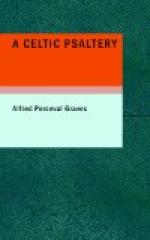THE LABOURER
(After Iolo Goch, “Iowerlt the Red,” a fourteenth-century bard and son of the Countess of Lincoln)
When the folk of all the Earth,
For the weighing of their worth,
Promised by his Ancient Word,
Freely flock before The Lord—
And His Judgment-seat is set
High on mighty Olivet,
Forthright then shall be the tale
Of the Plougher of the Vale,
If so be his tithes were given
Justly to the King of Heaven;
If he freely shared his store
With the sick or homeless poor—
When his soul is at God’s feet
Rich remembrance it shall meet.
He who turns and tills the sod
Leans by Nature on his God.
Save his plough-beam naught he judgeth,
None he angereth, or grudgeth,
Strives with none, takes none in toils,
Crushes none and none despoils;
Overbeareth not, though strong,
Doth not even a little wrong.
“Suffering here,” he saith,
“is meet,
Else were Heaven not half so sweet.”
Following after goad and plough,
With unruffled breast and brow,
Is to him an hundred-fold
Dearer than, for treasured gold,
Even in King Arthur’s form,
Castles to besiege and storm.
If the labourer were sped,
Where would be Christ’s Wine and
Bread?
Certes but for his supply,
Pope and Emperor must die,
Every wine-free King and just,
Yea! each mortal turn to dust.
Blest indeed is he whose hands
Steer the plough o’er stubborn lands.
How through far-spread broom and heath
Tear his sharp, smooth coulter’s
teeth—
Old-time relic, heron-bill,
Rooting out fresh furrows still,
With a noble, skilful grace
Smoothing all the wild land’s face,
Reaching out a stern, stiff neck
Each resisting root to wreck.
* * * * *
Behind his oxen on his path
Thus he strides the healthy strath,
Chanting many a godly rhyme
To the plough-chain’s silver chime.
All the crafts that ever were
With the Ploughman’s ill compare.
Ploughing, in an artful wise,
Earth’s subduing signifies,
Far as Baptism and Creed,
Far as Christendom hath speed.
By God, who is man’s Master best,
And Mary may the plough be blest.
THE ELEGY ON SION GLYN, A CHILD OF FIVE YEARS OF AGE
(By his Father, Lewis Glyn Cothi, 1425-1486)
One wee son, woe worth his sire!
My treasure was and heart’s desire;
But evermore I now must pine,
Mourning for that wee son of mine,
Sick to the heart, day out and in,
Thinking and thinking of Johnny Glynn,
My fairy prince for ever fled,
Leaving life’s Mabinogion dead.
A rosy apple, pebbles white,
And dicky-birds were his delight,
A childish bow with coloured cord,
A little brittle wooden sword.
From bagpipes or the bogy-man
Into his mother’s arms he ran,
There coaxed from her a ball to throw
With his daddy to and fro.




